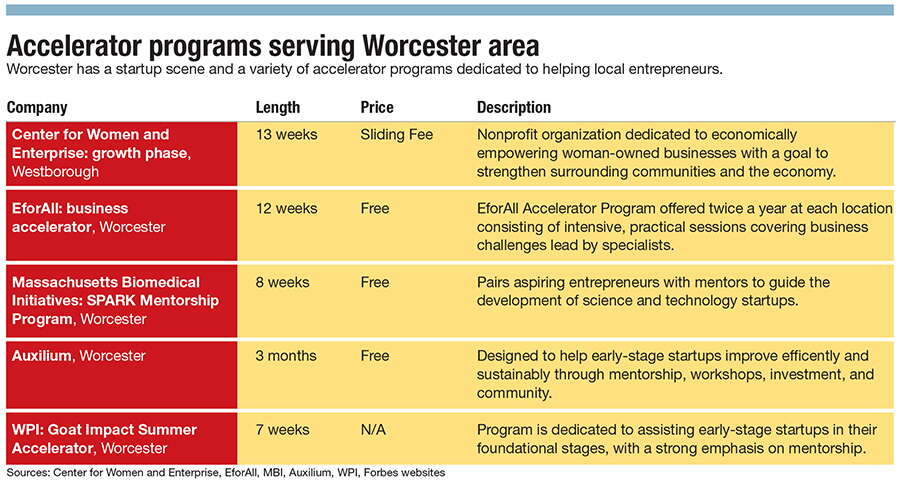
A helping hand: First cohort of startups at new Worcester entrepreneurship hub look to develop healthcare innovations
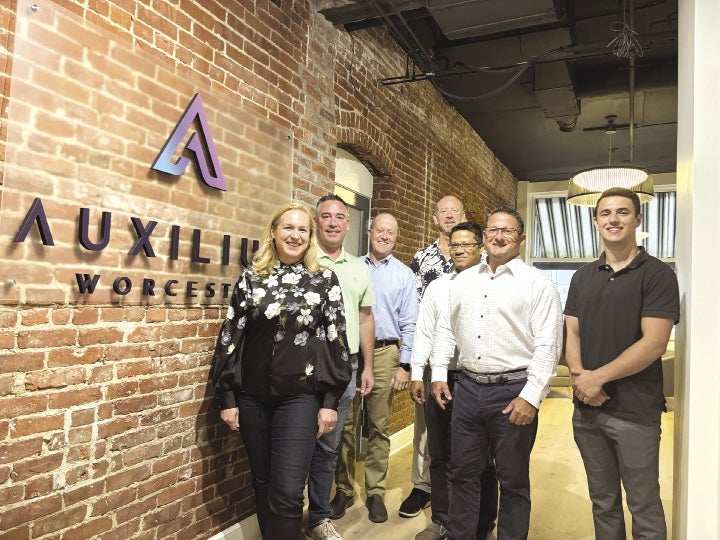 Photo I Courtesy of the Auxilium
The entire Auxilium cohort and support team includes (from left) Karen Cronholm from Akeyna; Thomas Schofield of Splice Histology; Michael Noonan from MiComp Solutions; Cliff Rucker, founder of Rucker Investments and the Auxilium; Dibs Mahanta and Keith Ledoux from MiComp; and Nick Gronda of College ROI.
Photo I Courtesy of the Auxilium
The entire Auxilium cohort and support team includes (from left) Karen Cronholm from Akeyna; Thomas Schofield of Splice Histology; Michael Noonan from MiComp Solutions; Cliff Rucker, founder of Rucker Investments and the Auxilium; Dibs Mahanta and Keith Ledoux from MiComp; and Nick Gronda of College ROI.
Seeking to boost Worcester’s growing reputation as a startup hub to the next level, an innovation studio and accelerator program launched by Rucker Investments and led by Zachary Dutton has launched to support entrepreneurs in the Worcester area.
Its first programming since its official launch in June, Auxilium’s three-month accelerator program is designed to help early startups through funding, workshops, mentorships, and community.
With the healthcare industry playing an outsized role in the Central Massachusetts economy, it makes sense that the first cohort of Auxilium is focused on healthcare-related technology; the three participants are Karen Cronholm, CEO and co-founder of Akeyna; Thomas Schofield, founder and CEO of Splice Histology; and Keith Ledoux, CEO of CompiSure Solutions.
“It's certainly great to have that support from Auxilium. The team here is amazing, and the community that they've built,” said Cronholm. “The knowledge and experience of the different experts that they've been having come in and chat with us has been great. It’s been just a variety of different kinds of expertise we've had come in, and we also have assigned mentors. It's very customized as well, so kind of based on our needs, and that's been wonderful to just have that extra support.”
Safer injections
Injections like Botox and dermal fillers, when done correctly, can have beautiful and life-changing results.
But if you accidentally inject Botox or fillers into blood vessels, it can cause serious complications such as blindness, skin necrosis, and even stroke. Akeyna aims to combat this problem by utilizing technology to detect blood vessels, preventing direct injections.
The Boston-based medical manufacturing company was co-founded by Cronholm and Dr. Molly Wanner. Cronholm has years of experience in the life sciences and medical manufacturing field, partnering with Wanner, a dermatologist at Massachusetts General Hospital in Boston.
Akeyna worked closely with dermatologist Dr. Rox Anderson, who has been behind aesthetic products like laser hair removal, and Dr. Gary Tierney at the Wellman Center for photomedicine at MGH to develop the smart needle.
“I’ve been in this industry for a while, and knew that this was a problem,” Cronholm said. “Dr. Wanner and I kind of put our heads together and said, ‘Hey, I've got the experience to sort of get the company up and running. Let's become co-founders,’ and that's how the company was born.”
About 7.8 million dermal fillers are administered annually, Cronholm said, and it is a seemingly simple injection. Still, even for the most experienced injector, it can have devastating effects if injected into a blood vessel.
Injectors are trained to avoid blood vessels; however, since we are all different individuals, our blood vessels are located in different places. Even the most highly trained injectors can inject into a blood vessel.
Although techniques exist to avoid it, there are few convenient and effective methods to prevent this complication. That’s a problem Akeyna is ready to solve, said Cronholm.
Akeyna is wrapping up the pre-clinical stage and is working on obtaining U.S. Food & Drug Administration product clearance to set up its human clinical studies and then be able to sell and market the product.

Solving sample problems
In 2023, Schofield was working for Quest Diagnostics as the director of anatomic pathology. The company played a vital role during the COVID pandemic, analyzing thousands of tests a day. But eventually, the phone stopped ringing.
Instead, patients started coming in for procedures like biopsies, a procedure many avoided during the pandemic. Many hospitals furloughed histotechnologists, specialized lab personnel who prepare and analyze tissue samples, as the number of schools offering a histotechnologist program declined, Schofield said.
Hospitals needed other ways to maintain their pathology turnaround time.
“We realized the problem isn't hospital-based. It's histology-based, okay, so we immediately started getting calls from veterinary pathology groups,” Schofield said, “From contract research, from pharma, they have the same problems. Some of the biotechs here locally don't have the money to have their histology laboratory looking at other options.”
Histology is the process of taking a human biopsy and then embedding it into paraffin wax. The histotechnologist then turns it into a slide for the pathologist to analyze. Unlike other laboratories, using AI to complete these jobs is years in the future.
However, in histology, numerous factors contribute to creating a beautiful slide. For example, the wind from the vents can affect the tissue sample, and so can the humidity, said Schofield.
Splice Histology was born to solve the problem of hospitals not being able to find these crucial laboratory staff. Without histotechnologists, some hospitals are keeping patients longer, adding a large expense to both the hospital and the patient. Splice provides histology services from initial specimen handling to advanced imaging and analysis and has been utilized by many hospitals and medical groups. The company has signed an agreement with Brown University Health.
Splice doesn’t just analyze tissue samples; it is promoting the histology profession by working with institutions like Quinsagmond Community College in Worcester and the University of North Dakota to expose people to the profession and see if histotechnology is right for them.
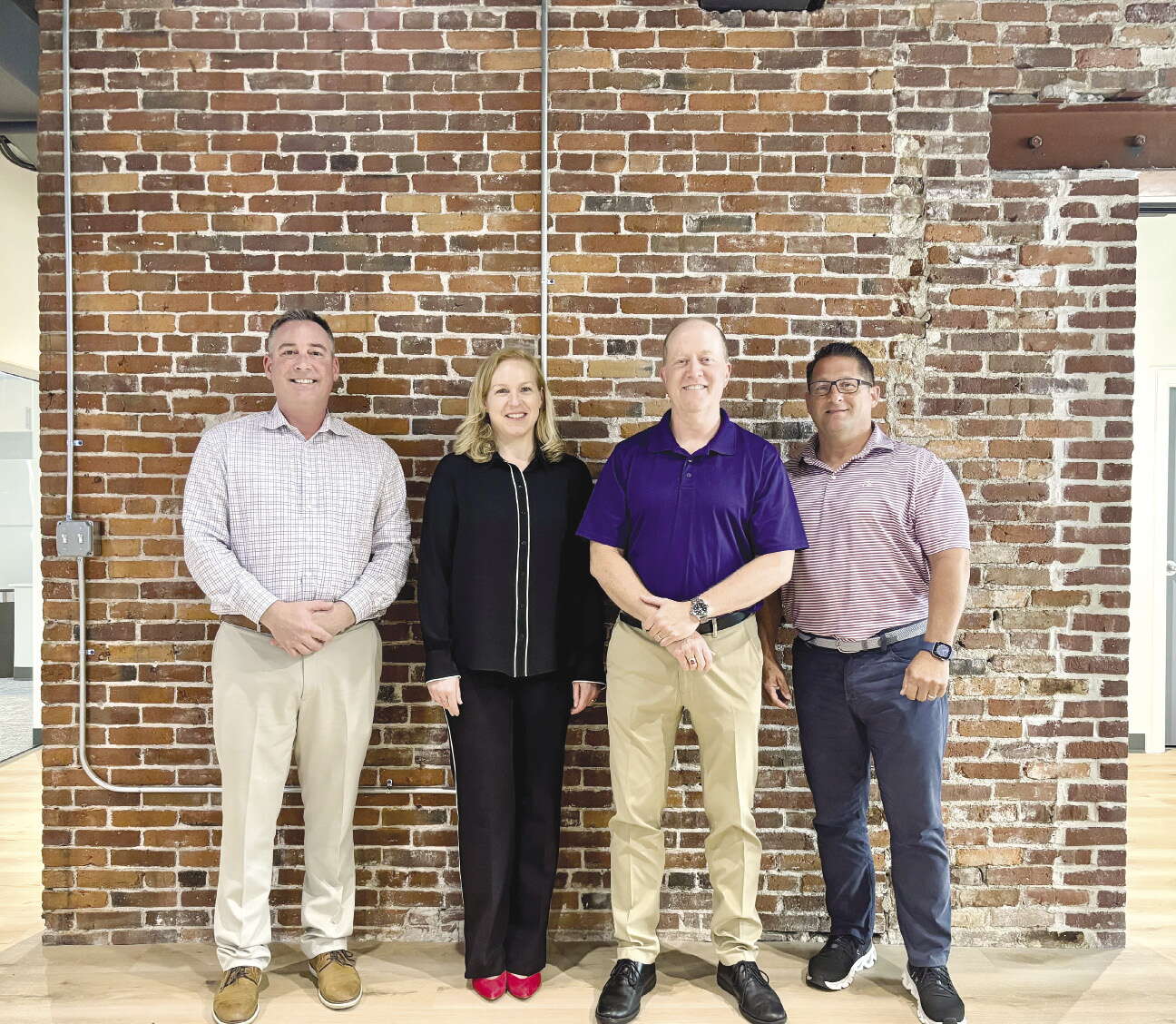
Next-gen insurance tools
CompiSure, which is the digital platform from MiComp Solutions, is led by Ledoux as CEO and simplifies the insurance sales and distribution process, ensuring an easy decision-making and purchasing experience for customers while enabling health insurance companies to take the right product to the right customer.
The platform aims to help companies drive digital transformation and integrate other sales platforms and technologies. The platform automates license tracking, training alerts, and compliance updates through one central dashboard to comply with healthcare laws like HIPAA. It is still in its pilot phase but is being edited based on feedback through real pilot vendors and brokers to ensure the needs of both the client and vendor are met.
“What we're doing is we're helping health insurance brokers who deal with members on one end and health insurance payers on the other end,” said Mike Noonan, chief operating officer at CompiSure. “There's a distribution channel there, and we have to sort of figure out what's the best way to sort of enter that channel and get traction. One way to do that is to focus directly on the brokers themselves. Brokers can operate as independents. They can operate as part of what they call field marketing organizations or as part of agencies.”
A critical part of the product is leveraging AI to provide companies with valuable insights into their business operations. However, CompiSure is focused on maintaining a balance between human work and AI, choosing to apply the tool only where it can have the most impact, not the entire solution, Noonan said.
“We want to make sure that we're using AI the right way, and one of the things that you know over time that our solution is going to enable our customers to get is insights on their business; how their business is trending, and those kind of things, whether they're brokers or whether they're carriers, that's the kind of thing that AI can help with,” Noonan said. “You can’t apply AI to every part of your solution. And there's a lot of, you know, technology out there that's trying to do too much with AI, and we want to make sure that we use it the right way.”
CompiSure aims to keep its product aligned with the evolving insurance market, particularly keeping an eye on Medicare and Medicaid. The company aims to initially roll out the product with commercial medicare integration to expand to other insurance mediums.
Lucy Coran is an editorial intern for Worcester Business Journal and a rising sophomore at Smith College.

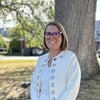



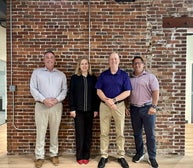






0 Comments